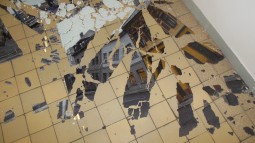Playing Hide and Law
A Visual Unraveling of the Latent Power of Law
Curator: Avi Feldman
Participating artists: Lawrence Abu Hamdan, Burak Arikan, Ariella Azoulay, Dalibor Bača, Tali Keren, Alona Rodeh, Carey Young
Opening: March 10, 2017 at 6pm
Venue: tranzit/sk, Beskydská 12, Bratislava
Exhibition dates: 11.3. – 13.5. 2017
Open: Wednesday – Saturday, 2-7 pm
Programme within the exhibition:
5.4. 2017 at 6 pm
lecture
Avi Feldman: Playing Hide and Law
tranzit.sk, Beskydská 12, Bratislava
5.4. 2017 at 8 pm
film screening
The Moscow Trials
directed by Milo Rau, Germany 2014, 86 min, Russian and German with English subtitles
A4 – space for contemporary culture, Karpatská 2, Bratislava
FREE SHUTTLE BUS TO THE OPENING:
ERSTE Foundation is offering a free shuttle bus from Vienna to Bratislava and back on March 10, 2017!
Meeting Point I
Opernring 13-15, 1010 Vienna, in front of Hotel Le Meridien
16:15 Registration
16:30 Departure
Meeting Point II
Am Belvedere 1, 1100 Vienna, in front of ERSTE Foundation
(orange entrance door)
16:40 Registration
16:45 Departure
20:00 Departure from Bratislava
21:00 Approx. time of arrival back in Vienna in front of ERSTE Foundation and afterwards in front of Hotel Le Meridien
Please be aware that the bus has to leave exactly on time
Please register here.
The closing date for registration is Tuesday, 7 March. Don’t forget to bring your passport or ID card for the trip!
Playing Hide and Law seeks to expose the latent power of the law. Through the perception of contemporary artists, it searches for and attempts to present new images of the law. By doing so, the exhibition tackles one of the most important characterizations of the law and any legal system, that is, a hidden, undercover system of power and control. Structuring the exhibition on the crux of visibility vs. non-visibility and presence vs. absence, the exhibition is a space in which law can be openly and directly investigated. It suggests an active role for the viewer through which one becomes aware of both the legal and artistic tactics and mechanisms of disguise and transparency, and points to the crucial condition in which the borders between politics, law, economics and society are continuously blurred. In this digital and globalized era in which we live, the exhibition suggests that it is increasingly vital to examine the consequences and effects it holds on our power to comprehend how law determines every aspect of our lives.
In these days of the massive sharing of images and sounds through a growing number of social and media platforms, basic human rights such as freedom of speech and freedom of movement are being put to the test. In the aftermath of Brexit and the US elections and the global war declared by the Trump administration on women and minorities, the exhibition can be perceived as a modest contribution to the re-formulation of political art which demands an engagement between law and art. Now, perhaps more than ever, there is a need to link law and art in order to spur new theoretical and practical measures redefining both spheres in the struggle for justice.
This sense of visual activism is expressed in a variety of artistic mediums and interventions: Lawrence Abu Hamdan questions the role of sound and speech in the court room; Ariella Azoulay calls for a reassessment of the Declaration of Human Rights as a never ending process in the creation of rights in the context of an art exhibition; Tali Keren tackles the legal ratification of a city urban plan through the act of singing; Alona Rodeh created a newly commissioned sculpture in which the image of Lady Justice is juxtaposed with that of the Jester; Burak Arikan, offers the spectator an active map through which the international relations of the penal system is discovered; On the other hand, Carey Young challenges us to re-examine the way law is written and the way it is read, while Dalibor Bača connects the exhibition to the immediate imagery of Bratislava as challenges us to re-think what we know of our immediate (legal) surroundings, and how we want the re-model society in relation to local and global legal systems.
ERSTE Foundation is main partner of tranzit.
The exhibition was also supported by Goethe Institut in Bratislava.
